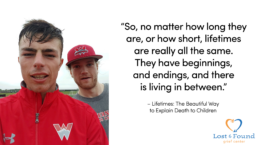Reflection Post by Mark Miller, Lost & Found Grief Center Executive Director
The third Monday in April is always a big deal for distance running fans – it’s the annual running of the Boston Marathon. Among distance runners, the race is known just as “Boston.” As in, “Did you qualify for Boston?” It is also the oldest and most famous of all the marathons in the United States.
A few people I know have run Boston before. Mostly acquaintances. This year, I was keeping a close eye on bib number 41 – Charlie Sweeney (pictured on the left in the photo next to Luke Miller)
Charlie and my late son Luke were friends and cross-country/track teammates at Western Colorado University. They met each other on their recruiting trip in the fall of 2016 and started college together in 2017.
Luke began having seizures in 2018, leading to an epilepsy diagnosis. He died in January 2019 when he had a seizure in his sleep and suffocated. He was just 20 years old.
I continued to follow Charlie’s running career and that of Luke’s Western teammates. I watched Charlie and the Mountaineers run at the NCAA Division II Indoor Track Championships in March of 2019 in Pittsburg, Kansas. Later that fall, I had dinner with Charlie and his parents in Fayetteville, Arkansas, when the Western cross country team competed at the University of Arkansas.
On Boston Marathon Monday 2025, I was thrilled to see Charlie finish 19th with a personal record time of 2:12. That’s 4:57 per mile. Luke and Charlie were comparable athletes and runners. Luke competed for the Western varsity cross country team as a true freshman, and he was on pace to run under 4:10 for the mile.
That’s not to say that Luke would have become a professional marathoner running in Boston. There are many variables that play into the success of a distance runner, including injuries, training response, and just the desire to continue to run 100-plus miles per week. I just don’t know what he could have achieved because he developed epilepsy at 19 and was dead by 20.
When a young person dies, you not only grieve for their life but also their future because it is an unrealized potential.
It was exciting to have someone to cheer on during the 2025 Boston Marathon, and I am thrilled for Charlie. I am also a little melancholy. Luke never had a chance to reach his running potential or achieve his goal to become a film director and screenwriter.
While I grieve what might have been for Luke, I am also grateful for the 20 years we had with him, including the movies and concerts we saw together, the 14,000-foot mountain we climbed in Colorado with his brother and cousin, and our family trips. I am thankful for those memories and knowing that he was loved and had friends.
“So, no matter how long they are, or how short, lifetimes are really all the same. They have beginnings, and endings, and there is living in between.”
From the book Lifetimes: The Beautiful Way to Explain Death to Children by Bryan Mellonie and Robert Ingpen.

